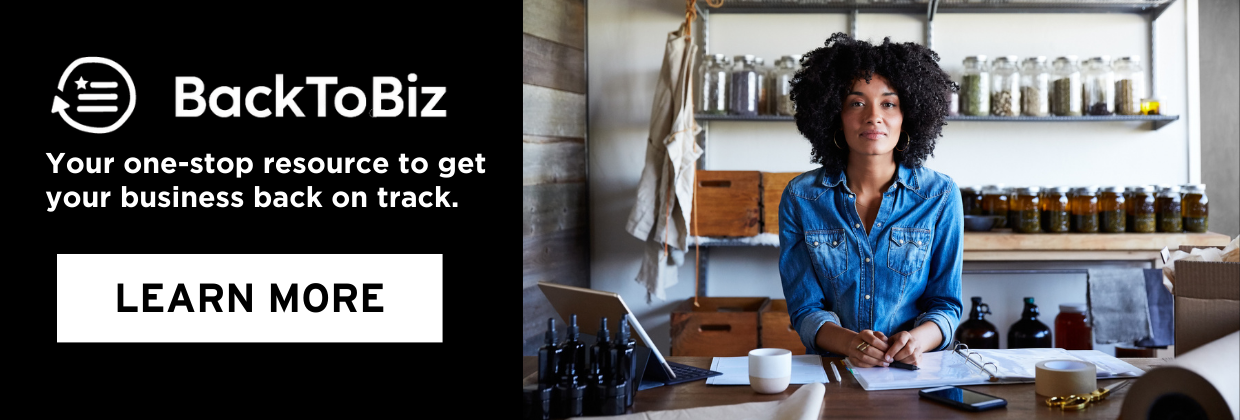As a small business owner, it’s likely that you’ve heard about federal programs such as the Paycheck Protection Program (PPP) or the Small Business Administration’s (SBA) Economic Injury Disaster Loan (EIDL). Perhaps you even received support from these programs yourself.
While these funds likely helped you make payroll, keep the lights on, and weather the worst of the COVID-19 pandemic, you might be asking yourself, now what? The flagship federal programs were primarily designed to provide emergency support, rather than longer-term recovery for small businesses impacted by the pandemic. This made sense at the time, but now we’re entering a different landscape where businesses will require a mix of relief and recovery resources for the foreseeable future as the impact of the virus ebbs and flows.
That’s why state and local entities, public, private and nonprofit, are partnering with groups like Community Development Financial Institutions (CDFIs) – purpose-driven organizations that direct capital into historically underserved communities and businesses – to help create programs that provide sustainable, recovery-based financing for small businesses.
In this article, we’ll highlight a few recovery programs working to support small businesses and share some tips on how you can stay up to date on future recovery efforts.
Local, State and Regional Recovery Programs
Looking for support as your small business recovers from the worst of the COVID-19 pandemic? CDFIs are a resource worth checking out. These mission-driven organizations have a long history of creating innovative solutions that funnel flexible capital and specialized advisory services to small business owners.
With deep community connections, several CDFIs have worked with local, state and regional entities to help design and implement small business recovery funds. The specific lending and advisory services provided by these funds vary, but each is focused on supporting small businesses as they recover from the pandemic.
Here are a few examples of existing state and regional recovery programs:
The Southern Opportunity and Resilience (SOAR) Fund
The SOAR Fund provides affordable financing and free business support services to eligible small businesses and nonprofits that employ 50 or fewer full-time equivalent employees (FTEs) across the Southern and Southeastern United States to help them rebuild from the COVID-19 economic crisis.
Quick Facts:
- Designed for: Small businesses and nonprofits
- Loan size: Up to $100,000
- Use of funds: Working capital, inventory, marketing, refitting for new social distancing guidelines, operating and emergency maintenance, property taxes, utilities, rent, supplies, and other appropriate business purposes.
- Location: Main office or headquarters of the business must be in located in Alabama, Arkansas, Delaware, Florida, Georgia, Louisiana, Maryland, Mississippi, North Carolina, Oklahoma, South Carolina, Tennessee, Texas, Virginia, West Virginia or Washington, D.C.
Learn more about the SOAR Fund
California Rebuilding Fund
The California Rebuilding Fund is a program that provides financing to California small businesses. Participating CDFIs provide loans to eligible small businesses that employ 50 or less full-time equivalent employees (FTEs) and had gross revenues of less than $2.5 million in 2019.
Quick Facts:
- Designed for: Small businesses
- Loan size: Up to $100,000
- Use of funds: Working capital, inventory marketing, refitting for new social distancing guidelines, operating and emergency maintenance, property taxes, utilities, rent, supplies, and other appropriate business purposes
- Location: Main office or headquarters of the business must be located in the state of California
Learn more about the California Rebuilding Fund
Washington Small Business Flex Fund
The Small Business Flex Fund is a new program that helps small businesses in the state of Washington grow and recover from the economic downturn. Supported by the Washington State Department of Commerce, the program helps small businesses and nonprofits with fewer than 50 employees access the financial support they need to thrive.
Quick Facts:
- Designed for: Small businesses and nonprofits
- Loan size: Up to $150,000
- Use of funds: payroll, utilities and rent, supplies, marketing and advertising, building improvements or repairs, and other business expenses.
- Location: Main office or headquarters of the business must be located in the state of Washington
Learn more about the Washington Small Business Flex Fund
What if I’m not in these areas?
If you aren’t located in one of the geographies listed above, don’t worry – there are many state and local programs in development.
For example, in 2021 the U.S. Treasury allocated a minimum of $52.6 million in funding to every state, D.C., and territory through the State Small Business Credit Initiative (SSBCI) for small business credit support and investment programs. Guidelines for this program are still under development, but state initiatives making these funds available will begin to launch in early 2022.
Additionally, other grant and loan programs may be available for your small business. Connecting with local small business support organizations, industry groups, and chambers of commerce is a great way to stay up to date on the latest in your community.
Another resource to check out is Connect2Capital, an online marketplace that matches small business owners with purpose-driven lenders. Connect2Capital also provides educational resources and assistance to help you prepare a loan application and assess your business readiness for financing.
The path forward
Small business owners have overcome immense challenges over the last year and a half. While many challenges remain, it’s important to know that you’re not alone in your recovery. Resources like the recovery programs summarized above are specifically designed to support your small business during this uncertain time.
Small businesses like yours will lead us forward through our economic recovery by continuing to invest in jobs and the communities where you operate. Thanks to your ingenuity – and focused efforts like recovery programs that support business growth – small businesses will continue to play a critical role in our national economy for decades to come.





